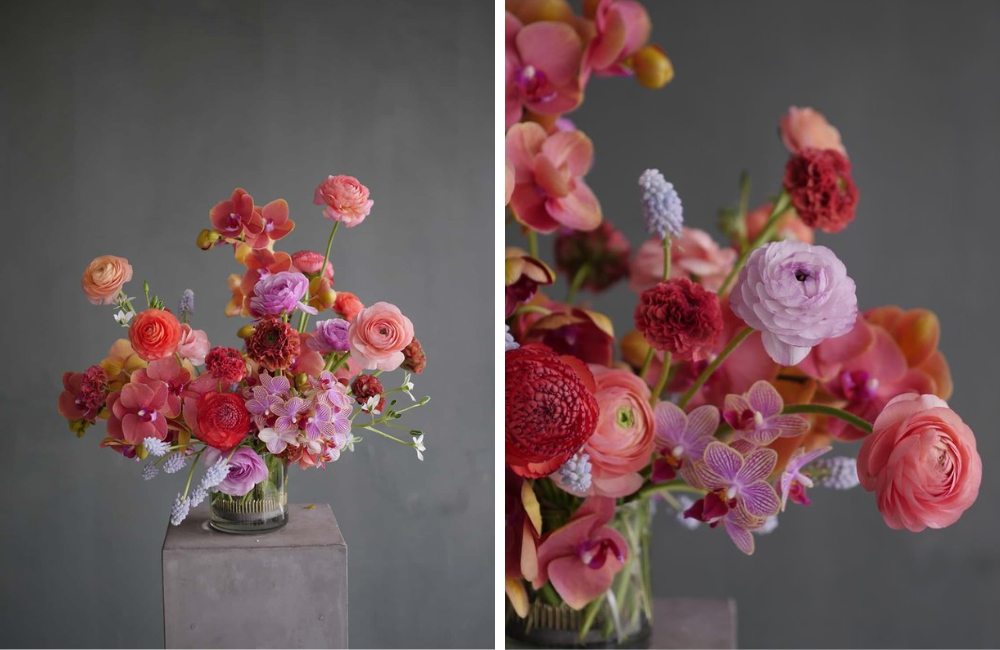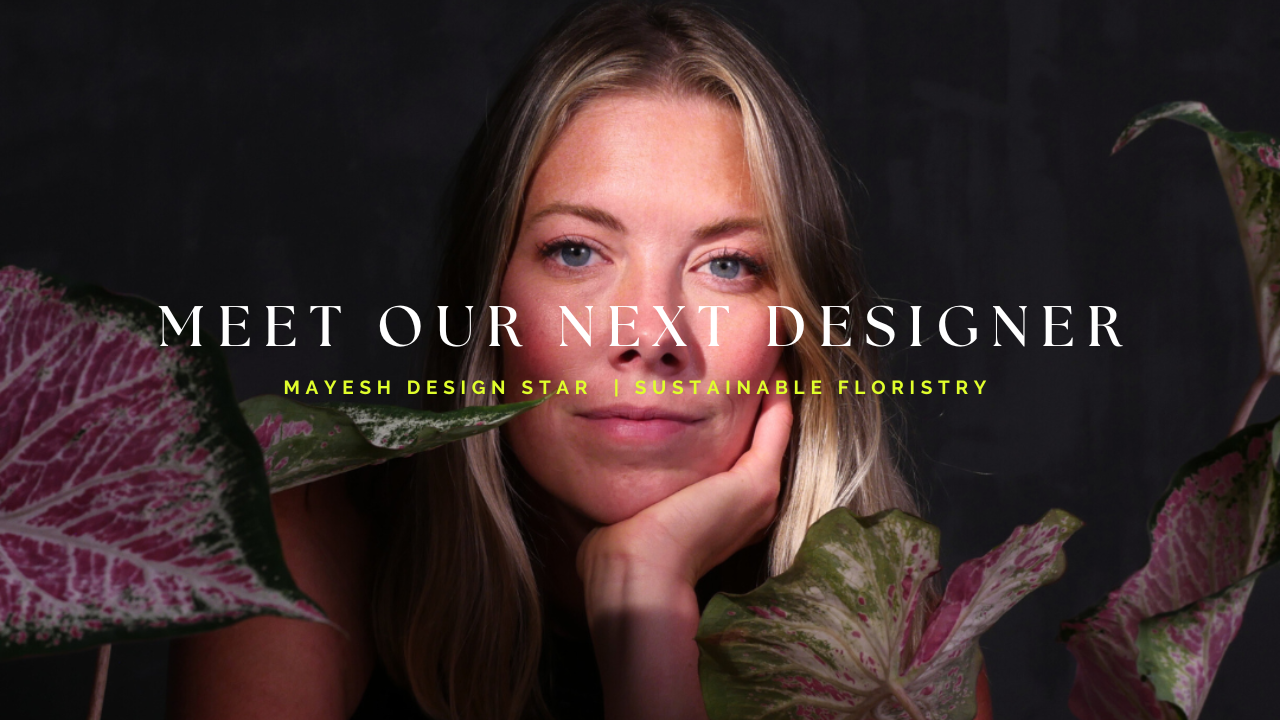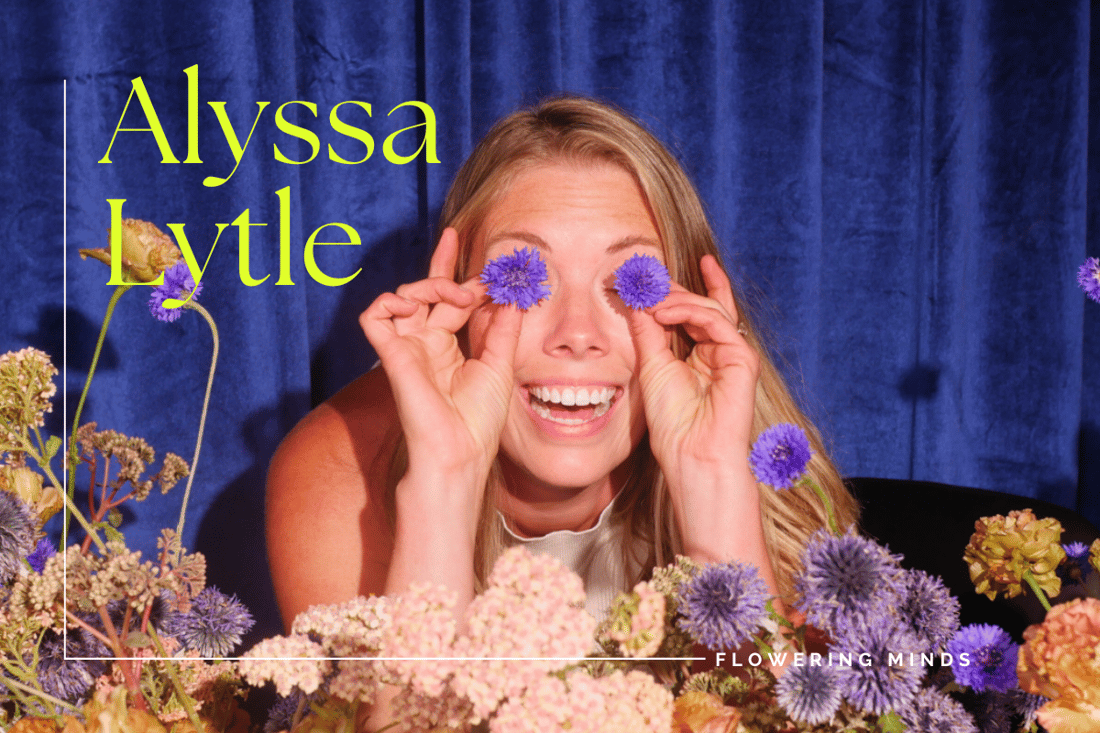Mayesh Design Star: Alyssa Lytle
With so many incredible designers so far this year, we're so excited to announce our FOURTH featured Design, it is with great pleasure that we introduce you to ... Alyssa Lytle of Flower Minds!
Alyssa is a seasoned floral designer with an eventful flower journey spanning over 15 years. From her humble beginnings as a shop florist in bustling Chicago, she moved across the country three times, to Austin and Portland and is now settled back in Texas on the outskirts of Austin enjoying the sunshine and peaceful quiet of hill country.
Alyssa's heart beats for two things: floral design and empowering others in the industry through floral education and coaching. With unwavering enthusiasm, she has made it her mission to impart her knowledge and expertise to fellow florists, helping them unlock their creative potential and achieve financial freedom through the captivating art of floral design.
Although she loves the art of floral design, her deepest passion lies in guiding floral entrepreneurs in creating thriving businesses that harmonize with their desired lifestyles. Alyssa derives immense joy from equipping budding florists with the essential skills and strategic business insights needed to flourish in today's competitive floral market. Her teachings go far beyond mere design techniques; she nurtures each individual's unique design voice, ensuring that their businesses not only bloom, but flourish.
Through her transparent and robust educational platform, Flowering Minds Education, Alyssa conducts monthly online classes focusing on sustainable design techniques and business strategies relevant to the current market. She loves hosting a site where she can connect like-minded florists to one another, nurturing the industry through connection and community.
When Alyssa isn’t engrossed in art and business, you can find her hiking in the sunshine, swimming, eating sushi, and exploring new places with her husband (and business partner!), Brian, and her 4 yr old son, Django.
We asked Alyssa a few more questions - be sure to keep on scrolling to read more and view examples of her stunning work!
What is your philosophy towards sustainability within our industry?
My philosophy on sustainability in the floral industry is balanced between supporting a strong ecosystem on Earth and having compassion for the human-ness within us all. Pursuing environmental sustainability involves the actions of countless individuals across diverse regions with different cultural norms, and with various levels of education, resources and knowledge. I believe that it is essential to approach sustainability with empathy and understanding, acknowledging that achieving 100% sustainability may not be feasible for everyone at a given instant. For example, some florists might face challenges in accessing locally grown flowers year round, so their journey towards sustainability will look different as they navigate how to run their business, support their family and take more sustainable actions.
Sustainability can be overwhelming when it’s a new topic, so I think focusing on what you can change in the very moment is a great place to start and can still lead to incredible impact when we all choose to make these simple decisions as a collective.
Firstly, I believe going foam-free represents a significant step towards sustainability. It is crucial for florists to be proactive in reshaping their business practices and offerings in order to go foam-free. We must never give away our power as business owners to our clients’ demands, as our business is ours to lead. Instead of feeling constrained by customer requests that may require unsustainable materials, we should be one step ahead with alternative designs that will both ‘wow’ the customer and not require the use of foam.
Secondly, eliminating harmful chemicals is paramount. To me, this aspect is crucial for the well-being of our planet and communities of people near and far. I actively avoid cleaning chemicals like bleach and DCD, along with the carbon black, phenol & formaldehyde found in floral foam, as well as avoiding flowers sprayed with harmful pesticides. Pesticides pose severe health risks to farm labor, florists, each florists’ families and employees and, lastly, our floral clients. The creation of pesticides and the disposal of the flowers once the customer is done with them is also incredibly harmful to our planet.
Rather than viewing sustainable practices as burdensome restrictions, I embrace them as liberating constraints that fuel creativity. Working within constraints almost always leads to unique solutions and the discovery of our authentic creative voices. It pushes us to explore our full potential, going beyond mainstream design patterns and fostering ingenuity in ourselves and the floral community.
Education plays a vital role in sustainability, and I believe in generously sharing information and setting an example to support this cause. However, I also acknowledge that each individual's journey towards sustainability is personal and unfolds at its own pace. Everyone may not reach the same conclusions simultaneously, but the focus should remain on striving for sustainability in our own endeavors and respecting the choices others make in their unique timelines. Only by pursuing sustainability with a compassionate outlook can we collectively work towards a more responsible future for our planet.
Where do you hope to see the industry in the next 5 years?
In envisioning the future of the floral industry five years from now, my hopes center around several key aspects. Firstly, I envision a stronger sense of connectivity among florists, fostering a supportive and collaborative community within the industry. Secondly, I aspire to witness florists equipped with a deeper understanding of business principles and personal boundaries, enabling them to thrive professionally and maintain a healthy work-life balance.
Furthermore, my vision includes the mainstream adoption of sustainable practices within the floral business landscape. I hope to witness environmentally conscious approaches becoming the norm, leading to a greener and more responsible industry.
In addition, I anticipate the emergence of flower farms in regions that have not traditionally been common for such ventures. By nurturing smaller local ecosystems for sourcing supplies, communities can reduce their reliance on importing goods from distant locations, promoting regional self-sufficiency and reducing carbon footprints.
Overall, my dream for the floral industry in the next five years is a united, ethically responsible, and locally empowered community of florists, driven by sustainable practices and thriving in a flourishing market.
Connect with Alyssa:
www.floweringmids.education.com

.png?width=1000&height=650&name=Mayesh%20Design%20Star%20alyssa%20lytle%20(1).png)
.png?width=1000&height=650&name=Mayesh%20Design%20Star%20alyssa%20lytle%20(2).png)
.png?width=1000&height=650&name=Mayesh%20Design%20Star%20alyssa%20lytle%20(3).png)
.png?width=1000&height=650&name=Mayesh%20Design%20Star%20alyssa%20lytle%20(4).png)
.png?width=1000&height=650&name=alyssa%20lytle%20design%20star%20(1).png)
Stay tuned for Alyssa's first video!
Connect with Alyssa:
www.floweringmids.education.com

